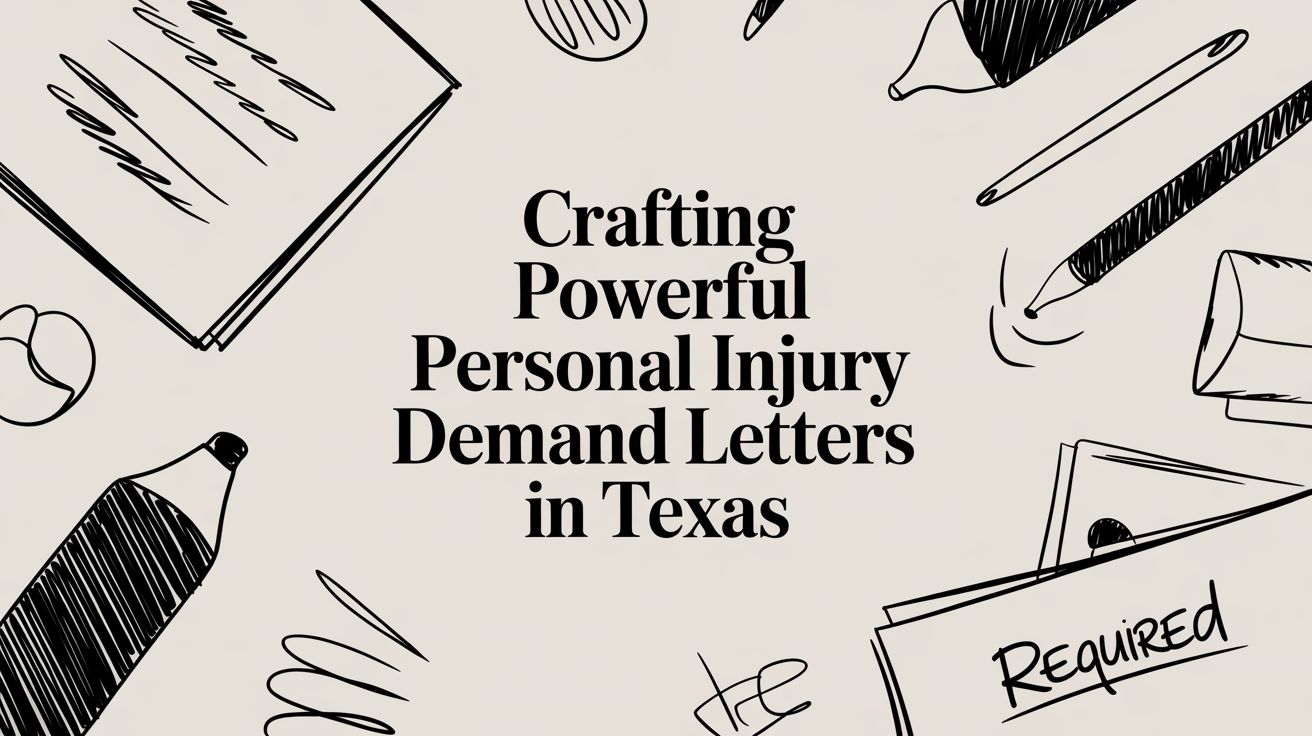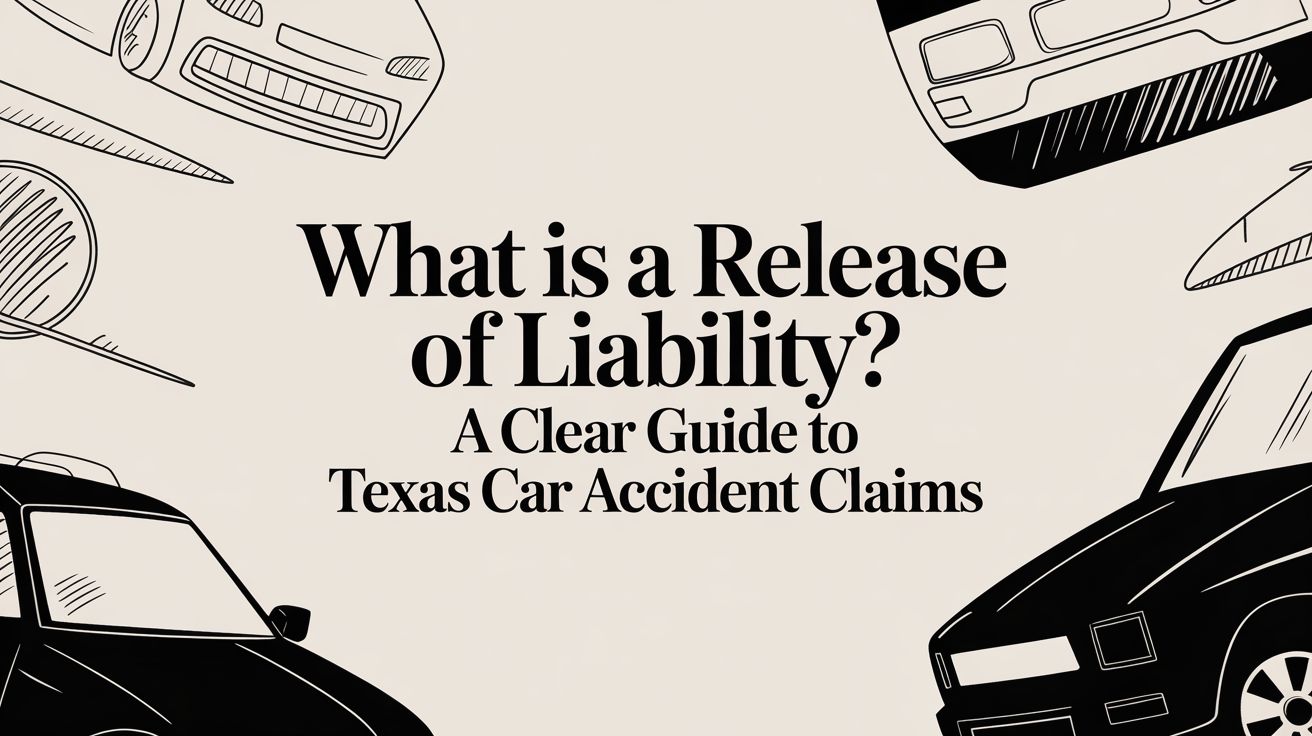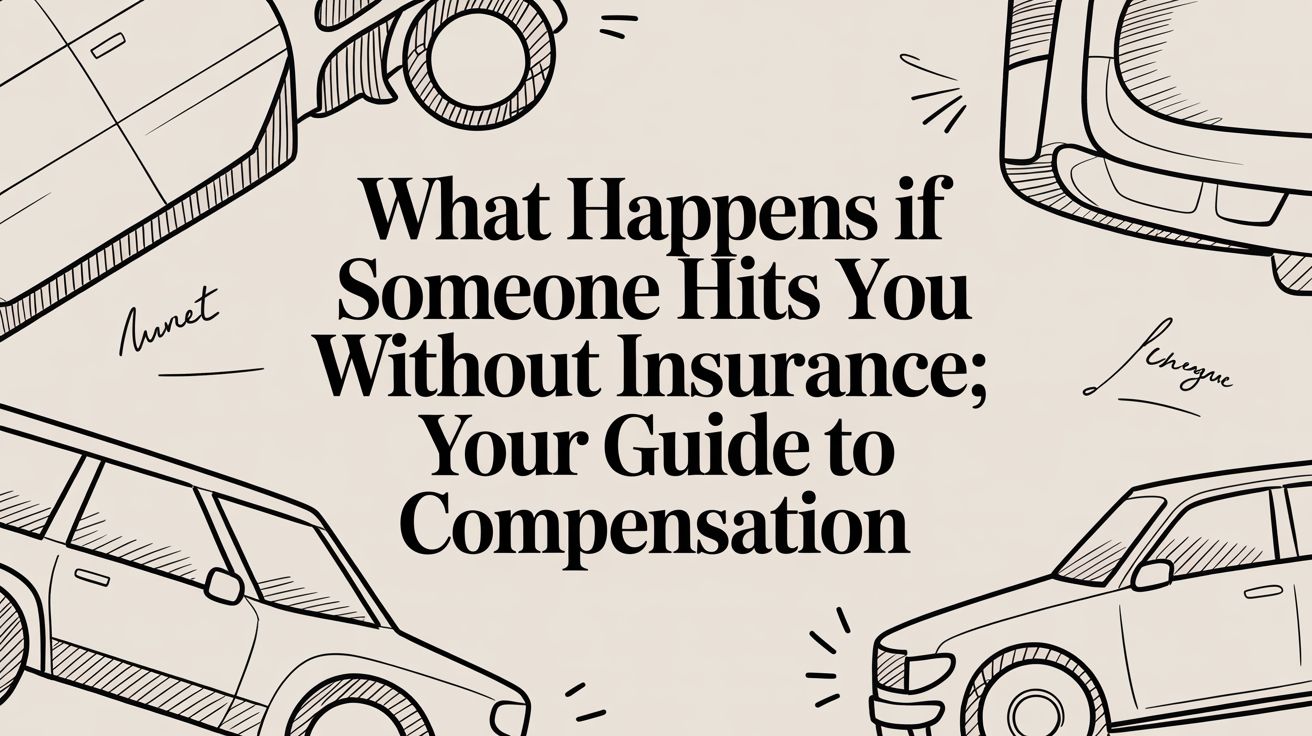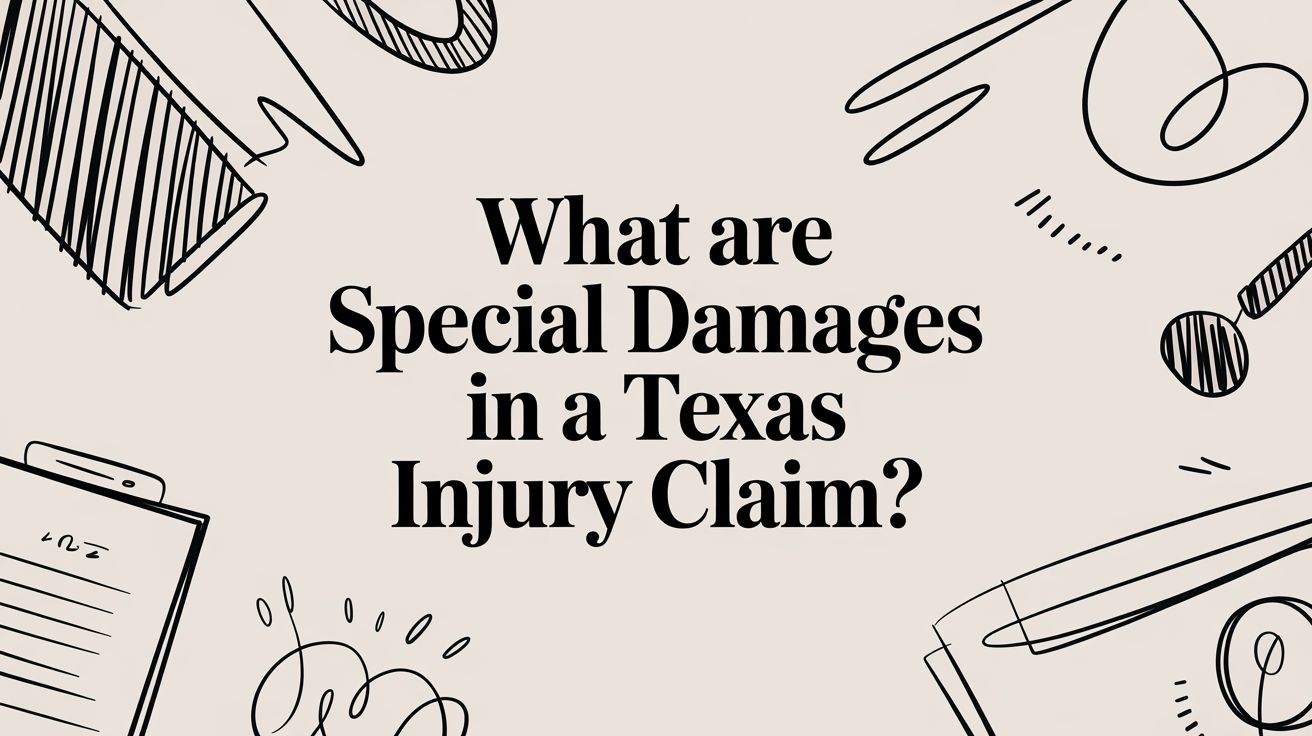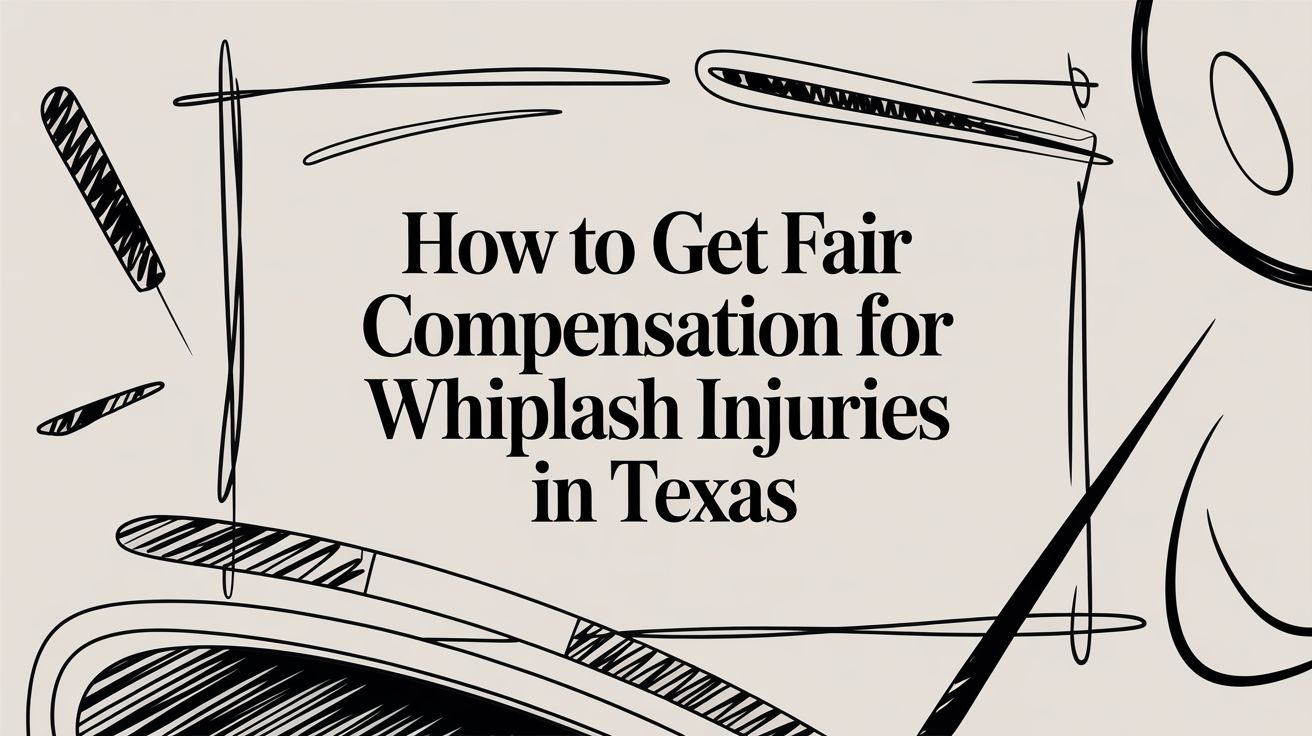A serious car accident can change your life in seconds—but you don’t have to face it alone. After a crash, your life can feel like it’s been turned upside down. One of the first, most pressing questions on your mind is probably, “How much compensation can I actually get for my car accident?”
In Texas, there’s no magic number or simple calculator. The true value of your claim is a deeply personal calculation, built on your specific losses, the details of the crash, and the strength of your case.
Your Guide to Car Accident Compensation in Texas
You don’t have to navigate the aftermath of a crash alone. The first step toward taking back control is understanding what your potential compensation is meant to cover. The legal system is designed to help make you “whole” again by providing a financial recovery for everything the accident cost you—physically, financially, and emotionally.
This process starts with two main categories of damages: economic and non-economic. The easiest way to think about them is as the tangible, receipt-based losses and the intangible, human losses you’ve been forced to endure.
What Does Compensation Cover?
- Economic Damages: These are the straightforward, calculable costs. Think of every bill, receipt, and lost paycheck that has piled up because of the accident. This is the financial bedrock of your claim.
- Non-Economic Damages: These are far more personal and address the human cost of the crash. This is where we account for the physical pain, the emotional distress, and the devastating impact on your quality of life.
After a Houston freeway crash, for example, a construction worker doesn’t just have a mountain of medical bills. He’s also dealing with the mental anguish of not being able to provide for his family or the frustration of no longer being able to enjoy his weekend fishing trips. Under Texas law, both of these losses have value.
A fair settlement has to account for every single loss—not just the ones with a price tag. Your peace of mind, your ability to enjoy your life, and your emotional recovery are just as important as the hospital bills.
To give you a clearer picture, we’ve put together a simple breakdown of what these categories include. Think of this table as a quick reference guide to understanding your claim’s potential value while you focus on your recovery. A dedicated Houston car accident attorney can help you identify and document every loss to make sure nothing gets missed.
Types of Car Accident Compensation in Texas
This table outlines the two main categories of damages you can claim after a car accident in Texas, with examples for each.
| Damage Category | What It Covers (Examples) | How It Is Valued |
|---|---|---|
| Economic Damages | Medical bills, lost wages, future medical care, property damage, lost earning capacity | Based on receipts, invoices, pay stubs, and expert financial projections |
| Non-Economic Damages | Pain and suffering, mental anguish, loss of enjoyment of life, disfigurement, physical impairment | Calculated based on injury severity, impact on daily life, and legal precedents |
Understanding these distinctions is the first step in building a strong claim. While the economic damages provide a clear baseline, it’s often the non-economic damages that reflect the true, human toll of an accident.
Calculating Your Economic Damages After a Crash
When you’re trying to put your life back together after a car accident, the bills are often the first and most stressful thing to pile up. These tangible, out-of-pocket losses are what we call economic damages, and they form the bedrock of your personal injury claim.
Think of them as the paper trail of the crash’s financial impact—every receipt, every invoice, and every lost paycheck is a piece of the puzzle. Calculating these damages isn’t just about adding up the first hospital bill. It’s about meticulously accounting for every dollar the accident has cost you, and every dollar it will cost you down the road. This is the first step in figuring out how much compensation you might be looking at.
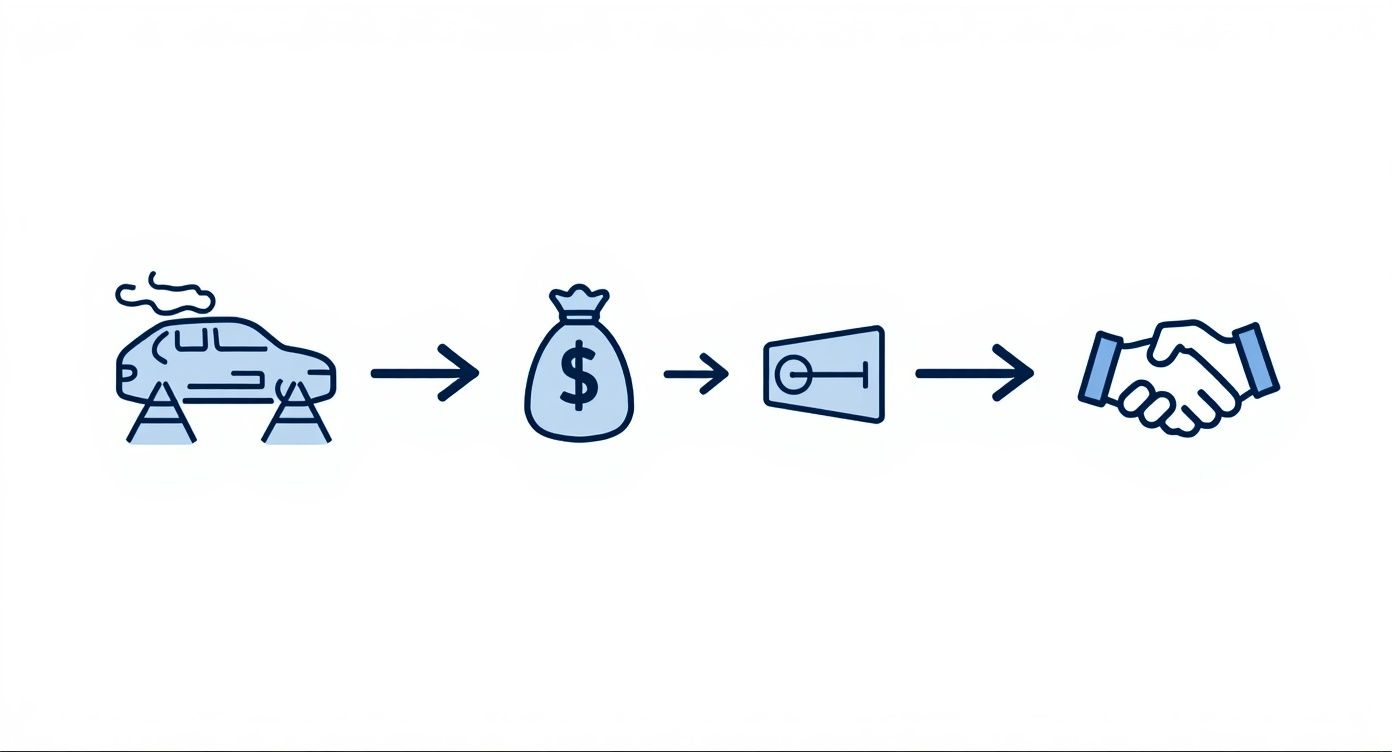
As you can see, there’s a direct line connecting the losses you can prove to the compensation you can get. That’s why keeping detailed records is absolutely essential.
Building Your Financial Recovery Piece by Piece
Let’s imagine a construction worker from Houston. A distracted driver blows through a red light and hits him, leaving him with serious injuries. His economic damages are far more than just the ambulance ride. They represent a complete financial snapshot of his life, both today and for years into the future.
To build a solid case, we have to identify and document every single one of these costs. Here’s a practical checklist of the most common economic damages we see:
- Current Medical Bills: This is everything from the ambulance and ER visit to surgery, hospital stays, MRIs, X-rays, and prescriptions. Every single medical expense counts.
- Future Medical Expenses: If your injuries need long-term care, your claim has to reflect that. This could mean future surgeries, physical therapy, pain management injections, or even medical equipment for your home.
- Lost Wages: This one’s straightforward—it’s the income you lost because you couldn’t work while you were recovering. We prove this with pay stubs and a letter from your employer.
- Loss of Future Earning Capacity: This is one of the most critical and often missed damages. If that Houston construction worker can’t do his physically demanding job anymore, we have to calculate the difference between what he would have earned and what he can earn now, for the rest of his working life. This often takes expert testimony from vocational and economic specialists to prove.
- Property Damage: This covers the cost to either repair or replace your vehicle, plus any personal items that were destroyed in the crash, like your laptop, phone, or glasses.
You absolutely must keep a detailed file of every expense. Every prescription receipt, every bill from a physical therapist, and every mile you drive to a doctor’s appointment adds to the true value of your claim.
The Importance of Detailed Documentation
Evidence is your best friend in a personal injury case. Start a folder—physical or digital—and keep everything. Your mission is to build an undeniable, evidence-backed story of your financial losses. Without proof, it’s just your word against a skeptical insurance company. For a closer look at how these numbers come together, you can learn more about how to calculate a car accident settlement in our detailed guide.
National data gives us a sense of how quickly these costs add up. The average property damage claim hovers around $6,551, while the average for bodily injury is about $26,501. However, many personal injury settlements land closer to an average of $52,900 because they successfully account for the full scope of the victim’s losses, not just the initial bills.
A Texas personal injury lawyer is crucial for this process. We help you get all your medical records, gather employment statements, and organize every receipt to build a powerful and persuasive claim that demands your complete financial recovery.
Understanding the Human Cost of an Accident
Medical bills and lost paychecks are easy enough to track, but they only tell part of your story. The true toll of a serious car accident goes far beyond what you can see on a spreadsheet; it hits your peace of mind, your daily happiness, and your ability to just live your life the way you used to.
In Texas law, these deep, personal losses are called non-economic damages. They’re a critical piece of the puzzle when we answer the question, “how much compensation for a car accident is actually fair?” These damages are designed to acknowledge the human cost of someone else’s negligence—the kind of suffering that doesn’t come with a receipt but is just as real as any hospital bill.

What Are Non-Economic Damages?
Think about all the ways the crash has changed your world. Can you no longer pick up your child without a shooting pain? Does the thought of getting behind the wheel trigger a panic attack? Do you lie awake at night, unable to sleep? These are the exact kinds of losses non-economic damages are meant to cover.
Here are the most common types your claim might include:
- Pain and Suffering: This is for the physical pain and discomfort you’ve had to endure because of your injuries—from the moment of the crash, through your recovery, and maybe for the rest of your life.
- Mental Anguish: This speaks to the emotional and psychological trauma. We’re talking about depression, anxiety, PTSD, a paralyzing fear of driving, or chronic stress that’s a direct result of the accident.
- Loss of Enjoyment of Life: This is about losing the ability to do the things that once brought you joy. For instance, a client who was an avid gardener, after a severe back injury from a truck crash, could no longer kneel down to tend to her plants. That loss is real, and it has value.
- Physical Impairment or Disfigurement: If the accident left you with scars, an amputation, or a permanent limp, this category provides compensation for both the physical limitations and the emotional weight of those lasting changes.
The human cost often extends to long-term needs, too. For victims with traumatic brain injuries, this can mean requiring specialized neurorehabilitation services just to relearn basic cognitive and physical functions.
How Is the Human Cost Calculated?
Putting a dollar amount on suffering is easily one of the most complex parts of a personal injury claim. There’s no magic formula, but insurance companies and courts do use a few methods to land on a number. One common approach is the “multiplier method.”
Here’s how it works: your total economic damages (medical bills, lost wages) are multiplied by a number, usually between 1.5 and 5. The more severe your injuries and the bigger the impact on your life, the higher the multiplier.
A minor sprain that heals quickly might get a multiplier of 1.5. On the other hand, a catastrophic injury that causes a permanent disability could easily justify a multiplier of 5 or even higher. An attorney’s job is to build a powerful case that argues for the highest possible multiplier for you.
Let me give you a real-world example. A young mother was in a nasty wreck on a Houston freeway and suffered a spinal cord injury, leaving her with chronic pain and limited mobility. She could no longer lift her toddler or go back to her demanding job as a nurse. While her medical bills were high, it was the non-economic damages—representing her daily pain, her emotional distress, and the loss of being the active mom she once was—that made up the largest part of her claim. A skilled attorney would use journals, therapist notes, and testimony from her family to prove the true depth of that human cost.
To dive deeper into this crucial topic, you can read our guide on how to calculate pain and suffering damages.
Your story matters. Your pain has value under Texas law, and our team is here to make sure it’s seen, heard, and properly compensated.
How Texas Laws Impact Your Compensation Amount
Trying to make sense of legal rules after a car accident is the last thing you want to do. It’s confusing and overwhelming. But a couple of key Texas laws directly control how much money you can recover, and you can bet the insurance company knows them by heart. They often use these rules to slash settlement offers or deny valid claims altogether.
The two big ones you need to know about are Texas’s rule on shared fault (negligence) and the non-negotiable deadline for taking legal action (statute of limitations). An experienced Texas personal injury lawyer lives and breathes these laws. Their job is to make sure these rules work for you, not against you.
How Does Texas Comparative Responsibility Law Work?
What happens if the insurance company points a finger back at you, claiming you were partly to blame for the crash? This is a classic insurance adjuster tactic, and in Texas, it’s governed by a rule called proportionate responsibility, also known as comparative responsibility or modified comparative negligence.
Simply put, this rule reduces your compensation by your percentage of fault. The catch? If you are found to be more than 50% responsible for the accident, you get nothing. Zero. This is known as the 51% Bar Rule, and it’s a harsh cutoff.
Here’s how it plays out in the real world:
- Scenario: You’re in a wreck at a Houston intersection. After everything is tallied up—medical bills, lost paychecks, pain and suffering—your total damages come to $100,000.
- The Problem: The other driver’s insurance adjuster argues you were going just a little over the speed limit. They decide you were 20% at fault.
- The Outcome: Under Texas law, your $100,000 compensation is cut by that 20%. The most you can now recover is $80,000.
Insurance companies love to assign partial blame. Even sticking a victim with just 10% or 15% of the fault saves them thousands of dollars. That’s exactly why you need a strong advocate to shut down these unfair arguments and protect your settlement.
How Long Do You Have to File a Claim in Texas?
There’s another Texas law that’s absolutely critical: the statute of limitations. Think of it as a countdown clock on your right to file a lawsuit. For the vast majority of car accident claims in Texas, you have exactly two years from the date of the crash to file your case in court.
If you let that two-year window close, your right to seek compensation is almost certainly gone forever. This isn’t a friendly suggestion—it’s a hard deadline that can completely sink your claim if you ignore it.
Two years can feel like a long time, but it disappears quickly when you’re building a solid personal injury case. The process involves:
- A Deep Dive Investigation: This means tracking down police reports, getting witness statements, and preserving crucial evidence from the accident scene.
- Full Medical Documentation: You often have to wait until you’ve reached “maximum medical improvement” to truly know the full scope of your injuries and what future care will cost.
- Tough Negotiations: It starts with sending a formal demand to the insurance company, which kicks off a long process of back-and-forth settlement talks.
Getting started right away gives your legal team the breathing room they need to collect evidence and build a powerful case long before that deadline ever becomes a threat. The legal framework around these claims is incredibly important, as different jurisdictions have their own regulations. For a wider view on how laws shape accident cases, you could explore a guide on understanding specific motor vehicle acts. Protecting your claim starts with knowing the rules and deadlines that govern it.
Key Factors That Influence Your Settlement
Ever wonder why two car accidents that look almost identical can end with wildly different settlement amounts? The truth is, the final number on a settlement check is never pulled out of a hat. It’s the result of a careful look at several key factors, and each one has the power to push the value of your claim up or down.
Figuring out “how much compensation for car accident” you might receive means digging into these details. It’s not just about how the crash happened; it’s about your specific injuries, the proof you have, and the steps you take afterward. An experienced Houston car accident attorney knows how to piece these elements together to build the strongest case for you.
The Severity and Permanence of Your Injuries
This is, without a doubt, the biggest piece of the puzzle. A minor whiplash claim that clears up in a few weeks is naturally going to be valued much lower than a case involving a catastrophic injury—like a spinal cord or traumatic brain injury—that demands a lifetime of care.
Insurance adjusters and juries will zero in on:
- The type of injury: Is it a broken bone, a soft tissue sprain, or a permanent disability?
- The length of recovery: How long did it take you to heal, or how long is it expected to take?
- The permanence of the injury: Are you left with lasting pain, scars, or physical limitations that won’t go away?
A Dallas construction worker who suffers a career-ending back injury in a truck crash in Houston will have a much higher claim value than someone who walked away with minor bruises. His settlement must cover not just the immediate hospital bills but a lifetime of lost paychecks and chronic pain. If the accident tragically results in a loss of life, the family may need a wrongful death lawyer Texas to pursue justice.
The Clarity of Fault and Quality of Evidence
How easy is it to prove the other driver was to blame? A case with rock-solid, undeniable evidence is always worth more than one where fault is up for debate. Any gray area gives the insurance company an opening to argue for a lower payout or, worse, try to shift some of the blame onto you—which, under Texas law, can slash your award.
Strong evidence is your best weapon. This includes things like:
- A clear police report that points the finger at the other driver.
- Dashcam or nearby surveillance footage that captured the crash.
- Statements from unbiased witnesses who back up your story.
- Photos of everything—the accident scene, the damage to both cars, and your injuries as they heal.
A case with a dashcam video showing the other driver blowing through a red light while texting is a slam dunk compared to a “he said, she said” argument with no witnesses. That kind of clear proof leaves very little room for the insurance company to fight back.
Actions That Can Weaken Your Claim
Unfortunately, it’s all too easy to hurt your own claim without even realizing it. Certain actions—or even a lack of action—can give the insurance company exactly the ammunition they need to reduce their payout. They are always on the lookout for a reason to pay less.
Watch out for these common mistakes:
- Gaps in Medical Treatment: If you wait weeks to see a doctor or start skipping physical therapy, the insurer will argue your injuries couldn’t have been that serious.
- Inconsistent Statements: Your story needs to be the same whether you’re talking to the police, your doctor, or the insurance adjuster. Any contradictions will destroy your credibility.
- Posting on Social Media: That picture of you at a friend’s party or a “feeling great today!” post can be twisted and used to argue you aren’t as injured as you claim.
The financial stakes here are serious. The latest industry data shows that accident claims often involve over $3,000 in property damage and can easily top $15,000 in bodily injury costs per person, and inflation is only pushing those numbers higher. To get a better sense of how these figures play into the back-and-forth with the insurance company, you can read our guide on how to negotiate a personal injury settlement.
Why a Lawyer Can Maximize Your Compensation
After a wreck, trying to handle a personal injury claim yourself is like walking into a negotiation with a professional poker player—you’re almost guaranteed to leave money on the table. Insurance companies are businesses, plain and simple. Their goal is to protect their bottom line by paying out as little as they possibly can.
This is where an experienced Houston car accident attorney becomes your most crucial ally.

Hiring a lawyer completely changes the dynamic. It sends a clear message to the insurance company that you’re serious about getting the full and fair compensation you’re owed under Texas law. You need a pro in your corner who knows their playbook and isn’t afraid to fight back.
The Strategic Value of a Personal Injury Attorney
A good attorney does so much more than fill out paperwork. They meticulously build a powerful, evidence-backed case designed to prove what your claim is truly worth and shield you from lowball settlement offers.
Here’s a glimpse of what that looks like:
- Conducting a Thorough Investigation: We dig deep, gathering police reports, tracking down and interviewing witnesses, and preserving critical evidence before it vanishes.
- Hiring Respected Experts: For serious injuries, we often bring in medical specialists, economists, and vocational experts. Their testimony is key to proving the extent of your future medical needs and calculating your lost earning capacity for the rest of your working life.
- Accurately Calculating Your Claim’s Full Value: We leave no stone unturned, documenting every single economic and non-economic loss. Nothing gets overlooked when we determine how much compensation you should demand.
- Handling All Negotiations: Your lawyer becomes the single point of contact with the insurance adjuster. This is huge—it protects you from accidentally saying something that could be used against you and lets you focus completely on getting better.
Protecting You From Insurance Company Tactics
Insurance adjusters are trained negotiators. They might seem friendly and concerned on the phone, but their job is to minimize your payout. They’ll try to get you to give a recorded statement they can twist, drag out your claim hoping you’ll get desperate and take a low offer, or dangle a quick settlement that doesn’t even begin to cover your future medical care.
A skilled lawyer sees these moves coming a mile away. We manage every communication, shut down unfair offers, and steadily build pressure on the insurer. If they refuse to negotiate in good faith, we’re already prepared to take them to court.
For instance, after a devastating truck crash in Houston, the insurer might try to argue the victim’s injuries aren’t as bad as they seem. A truck crash lawyer Houston immediately counters this by presenting detailed medical records and expert testimony, forcing the insurer to confront the true, long-term costs of the injury.
You’ve been through enough. Let a legal professional handle the fight for the compensation you deserve.
Common Questions We Hear After a Car Accident
When you’re dealing with the aftermath of a serious crash, it’s completely normal to feel overwhelmed and have a million questions running through your head. Here are some straightforward answers to the questions we get asked most often by victims and their families across Texas.
How Long Does a Car Accident Settlement Take in Texas?
Honestly, it varies. There’s no single timeline that fits every case. A relatively simple claim, where the other driver’s fault is crystal clear and injuries are straightforward, might wrap up in just a few months.
But if your case is more complicated—think severe injuries, disputes over who caused the wreck, or multiple parties involved—it could easily take a year or more. If the insurance company refuses to be reasonable and we have to file a lawsuit, that adds more time to the process. An experienced attorney knows how to keep things moving and push for a resolution, but we’ll never rush a settlement at the expense of its full value.
Should I Accept the First Offer from the Insurance Company?
In almost every situation, the answer is a firm no. You have to remember that the insurance company is a business, and their first offer is a business tactic. It’s designed to be a lowball amount to see if you’ll take a quick, cheap payout and just go away.
Always think of that first offer as the starting line for negotiations, not the finish line. Before you even consider accepting anything, you need to talk to a Texas personal injury lawyer. We can figure out what your claim is really worth and make sure any offer on the table actually covers all of your damages, both now and in the future.
An insurer’s first offer is a starting point for negotiations, not a fair assessment of your claim’s worth. Accepting it means leaving money on the table that you need for your recovery.
What if the Other Driver Has No Insurance?
This is a scary situation, but it doesn’t mean you’re out of options. If the driver who hit you is uninsured or doesn’t have enough insurance to cover the full extent of your losses, you can often turn to your own insurance policy.
This is where Uninsured/Underinsured Motorist (UM/UIM) coverage comes in. It’s an optional but absolutely essential part of any Texas auto policy. A lawyer can dig into your policy documents, figure out your coverage limits, and help you file a claim with your own insurer to get the benefits you’ve been paying for. This coverage can be a financial lifesaver.
At The Law Office of Bryan Fagan, PLLC, we understand the uncertainty and pain you are facing. We want you to know that recovery is possible, and you don’t have to navigate this journey alone. We are here to provide the clarity, trust, and hope you need to move forward. For a free, no-obligation consultation to discuss your case and understand your rights, contact us today. Let us help you take the first step toward getting the justice and compensation you deserve. You can reach us at https://texaspersonalinjury.net.



